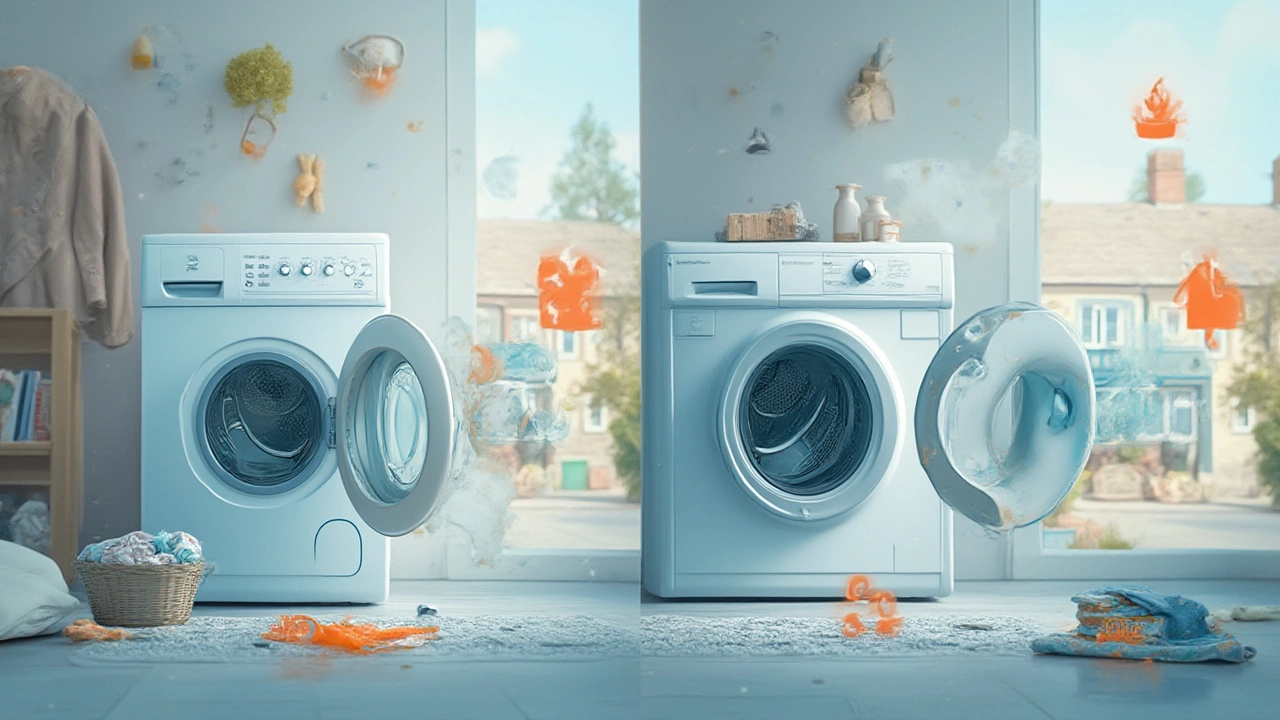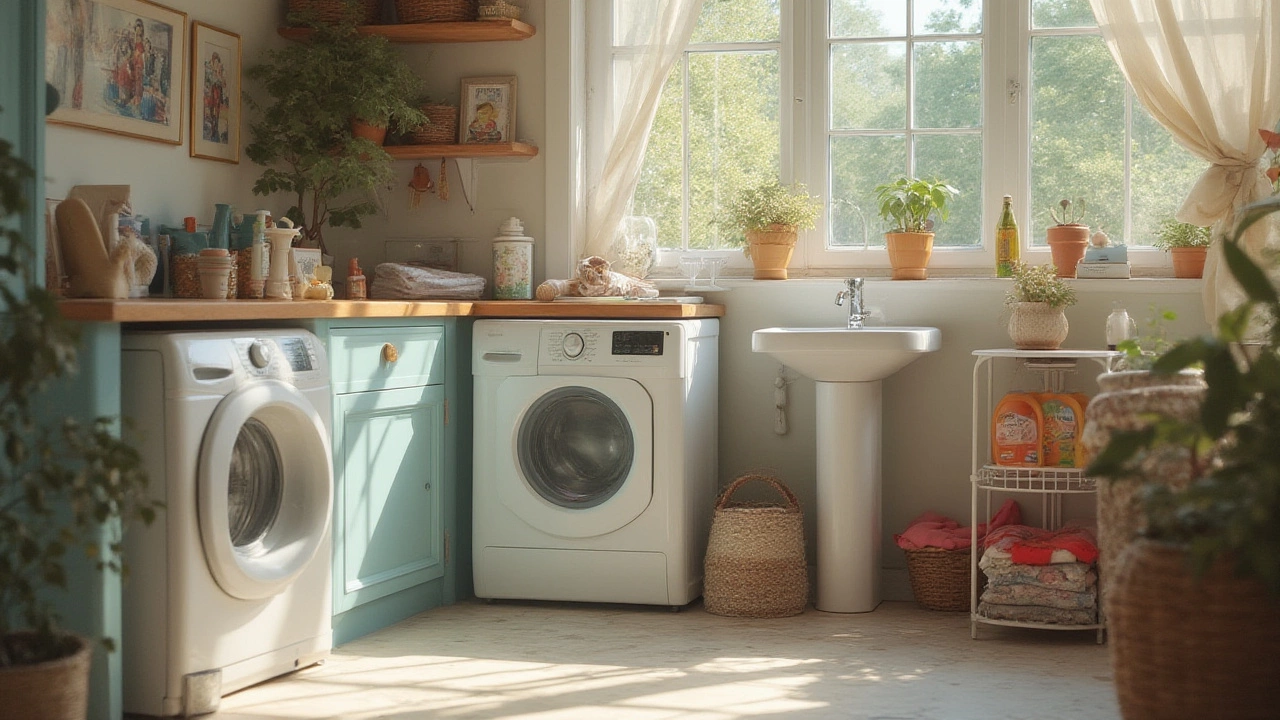Imagine lugging a basket of dirty clothes to your washer, pressing the familiar button, and...nothing. Silence. Your faithful washing machine has finally quit. If you've ever found yourself wondering just how long these home workhorses last or how to squeeze every last spin out of one, you're not alone. The lifespan of washing machines is a hot topic, especially considering how pricey (and essential) these appliances have become over the years. Some people treat them as disposable tools, but plenty depend on them to power through the messes of everyday life without fail. So, what’s the story behind how long washing machines really last? And more importantly—how can you make yours last even longer?
The Real Numbers: What’s the Longest Average Washing Machine Lifespan?
Let’s get straight to the meat: statistics on washer longevity. According to a detailed 2023 report by the Association of Home Appliance Manufacturers, the washing machine lifespan is about 10 years on average. Still, the numbers shift once you break them down by type and brand. Front-loading washers tend to outlast top-loaders by a year or two, mainly due to better energy efficiency and fewer moving parts. But there’s more. High-end brands like Miele and Speed Queen routinely top the charts, sometimes lasting up to 20 years with routine care.
If you’re someone who likes seeing data at a glance, check out this table showing some well-known brands and their typical lifespan ranges based on real-world owner surveys and field data:
| Brand | Average Lifespan (Years) | Warranty (Years) |
|---|---|---|
| Miele | 15-20 | 10 |
| Speed Queen | 15-25 | 5 |
| LG | 10-13 | 2-10 |
| Whirlpool | 10-12 | 1-5 |
| Samsung | 8-12 | 1-5 |
| Electrolux | 8-12 | 1-5 |
| GE Appliances | 8-11 | 1-5 |
Of course, this doesn't mean every washer will last exactly that long. Heavy use, water quality, installation, and how well you take care of the machine play a huge part. So while Miele and Speed Queen are champions by the numbers, there are plenty of stories of budget brands ticking past their predicted lifespan—sometimes just out of stubbornness!
Things That Kill Your Washer Early
Let’s be real—washing machines aren’t designed to live forever. It’s usually not some big dramatic explosion that ends their life either. Instead, it’s a collection of silent annoyances that quietly roast your washer’s insides while you’re dealing with your third load of towels.
First on the death list is overloading. Sure, cramming an extra pair of jeans might save one trip, but this habit stresses the drum, bearings, and suspension. Consistent overstuffing stretches belts, shakes parts loose, and eventually ruins key components. Next is hard water. If your water’s full of minerals, it’ll leave scale buildup inside the machine, quietly eating away at essential parts and sensors. Lots of people ignore this step, but if you live in an area with hard water, a simple inline water softener or even regular descaling with a machine cleaner can add years to your washer’s life.
Ever hear your machine go off-balance, banging like the world’s angriest marching band? Allowing a washer to run like this (often from uneven loads) puts strain on the bearings and suspension. Repeat it enough times and you’ll start hearing that metallic screech—a sure sign your machine’s begging for mercy.
Too many households still use more detergent than needed, thinking that a “little extra” will make things sparkle. Surprise: most modern washers use high-efficiency cycles and only need a tablespoon or two. Extra soap leaves residue that gunks up components, clogs hoses, and encourages mold in nooks and crannies. If you constantly smell something musty, you might be looking at the effect of soap gone wild.
Ignoring maintenance is a silent killer as well. That little “clean pump filter” warning? Most folks don’t even know what it is until the washer stops draining—a small effort every couple months can put off bigger repairs. Finally, environmental factors matter—humid basements, leaky utility rooms, or machines wedged tight in closets don’t let washers dry out, increasing the risk of rust and circuit failure. Attention to these little details can be the difference between upgrading by choice and a midnight panic run to the laundromat.

Ways to Make Your Washer Last (Way) Longer
Keeping a washing machine running past the average lifespan isn’t black magic. It’s mostly about paying attention and acting before problems turn into major repairs. Want the best odds? Start with a few easy habits:
- Don’t overload. It saves the motor, drum, and suspension—plus your back.
- Use the right detergent and measure carefully—especially if you’ve got a high-efficiency washer.
- Leave the door or lid open after a wash to let moisture escape. Mold hates air flow more than you hate mildew smell.
- Wipe down the drum, door, and gasket after each load. A two-minute job that dodges grime and gunk.
- Clean the pump filter and detergent drawer every couple of months. Yes, it’s gross—but so is a flooded laundry room.
- If you have hard water, use a machine cleaner or descaler every 4–6 weeks.
- Make sure your washer is sitting level. Run a load with towels and see if it wobbles—minor adjustments with the feet make a difference.
- Try to address minor noises or leaks right away. Letting the “clunk” or “drip” linger could mean a $10 fix turns into needing a new machine.
Some owners swear by running a hot, empty cycle once a month using white vinegar. This helps break up mild buildup and keeps unwelcome odors at bay. For front-load machines, paying special attention to the rubber gasket around the door is a must—mold loves to hide there, and it’ll shorten the lifespan if it’s not kept clean and dry. There’s no keeping up with daily grime, but these little habits do add up. In fact, research published by Consumer Reports in early 2024 found that owners who follow a basic washer maintenance routine see machines last 3–5 years longer on average compared to folks who just set and forget.
When to Repair and When to Replace: Making the Big Call
The day always comes when you’re facing a washer that won’t spin, drain, or even turn on. So is it worth fixing your old reliable machine, or is it time to let go? The standard rule floating around (and echoed by appliance technicians) is this: if repair costs more than half the price of a new washer, start shopping. But there are a few more things to weigh:
- Check warranty status—some major issues might still be covered.
- Look up replacement parts availability. Some older brands disappear from shelves fast.
- Think about the age and history. If your machine’s already a decade old and starting to stack up little problems, even a cheap fix might just buy you a few more months.
- How energy efficient is your current machine? Newer models use far less water and power, which might save you money every month and help pay off a replacement.
There’s a real-life trick shared by appliance techs: if your washer is otherwise healthy and you just need a belt, pump, or switch swapped out, it’s almost always worth it. But once you’re facing a new drum, mainboard, or out-of-stock parts, replacement is often less headache (and less money) in the long run. Of course, older commercial grade or European machines (Miele or Speed Queen) might be worth forking over the repair bill—especially if you already love how they run.

Brand Breakdowns and Buyer Considerations
Choosing your next washer isn’t about picking whichever model’s on sale that weekend. A few brands are known for longevity, and some types fare better depending on your needs. Speed Queen, a US favorite built for heavy-duty laundromats, is nearly legendary for its 20-25 year lifespan and old-school “built like a tank” design—though the up-front price is steeper than most. Miele (from Germany) is famous for lasting nearly two decades, but their machines do need professional servicing now and then. LG and Samsung have pushed the envelope with high-tech features, but their lifespan is a few years shorter, especially if you don’t keep up on maintenance.
Here are some quick buyer tips if you’re searching for a washer that might outlive your WiFi router:
- Check drum materials—stainless steel lasts longer than plastic or porcelain.
- Look at warranty terms and research service availability in your area.
- Don’t just focus on capacity—make sure it fits your space and hookups.
- Check out online owner reviews for lifespan complaints or common failure points (bearing failure, electronics glitches, etc).
- Consider top-loading if you want a simple, easy-to-fix design, or front-loading if you prefer water and energy savings.
- If you’re part of a big, messy family, it’s worth going for machines with fewer complex electronics—they're easier and cheaper to fix.
Remember, the priciest model isn’t always the best. Putting a little extra time into researching reliability pays off in headaches saved down the road. Real-world feedback matters—there are online forums full of owners with stories both traumatic and triumphant. And if you want guaranteed years of service, stick to models known for repairability (with easily available parts and a simple build).
So, while no washing machine lasts forever, a mix of smart use, a little regular care, and a wise purchase up front can help you get well past the 10-year average. Treat your washer kindly, keep your maintenance game tight, and don’t ignore small warning signs. Who knows—your machine could still be chugging along healthy while your neighbor’s already on their third one. Isn’t that the win that really matters?



